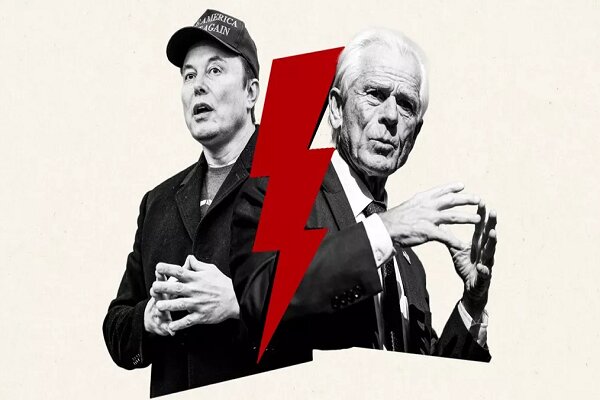TEHRAN – By April 9, the United States faced serious political and economic turbulence due to a fierce conflict between Tesla CEO Elon Musk and Peter Navarro, senior trade adviser to President Donald Trump. The conflict rooted in Trump’s assertive tariff policy revealed internal discord within the administration, raised concerns about its economic approach, and published extensive discussions on the potential impact on both the domestic and international economies.
The line between Musk and Navarro was triggered by Trump’s announcement regarding imports against imports from more than 180 countries. This includes 104% of Chinese products and 20% of European Union products. Navarro, a solid advocate for these tariffs, argued that they would stimulate US production and reduce the trade deficit. Musk, a supporter of free trade, strongly opposed the policy, leading to public conflict.
On April 7, Navarro rejected the “Zero Tur Fif” policy on CNBC, labeling Tesla as a “automobile assembler” that relies on imported parts. Musk retaliated via X on April 8, calling Navarro “really stupid” and chuckling Dr. Harvard Economics. Musk defended Tesla’s American-made qualifications and cited data showing the Model Y as the most American-made car to supply the Model Y in the country.
The conflict quickly attracted media attention, with White House press secretary Caroline Leavitt disregarding the conflict by saying, “Boys will be boys.” However, critics argued that this response was a minor policy dispute with potential economic impacts.
The reason behind the collision
Musk Navarro’s feud is rooted in basic ideological and economic differences as well as personal and professional competition. Several key factors that contributed to the conflict:
A stubborn protectionist, Navarro has long pushed tariffs to protect US industry and reduce dependence on foreign goods. His role in creating Trump’s tariff strategy detailed in Project 2025 reflects his belief that Musk will pull jobs back to the US as a global businessman for businesses that rely on Tesla and the international supply chain, in contrast to the high tariffs. He argued on April 8 that tariffs would increase Tesla’s costs and hurt consumers, undermining its vision of innovation and efficiency.
Both men have a great stake in the outcome. Navarro’s impact will depend on the success of Trump’s tariff policy, but if tariffs are fully implemented, mask companies could face billions of dollars at additional costs. This economic self-interest has fueled their public conflict by accusing Musk of misunderstanding the dynamics of trade and by accusing Musk of prioritizing corporate interests over national interests.
This competition also reflects the broader power struggle in Trump’s administration. Musk is the head of the Government Efficiency Bureau (DOGE) and has emerged as a key adviser on deregulation and innovation, but Navarro, as a senior counselor in trade and manufacturing, is more shaking than trade policy. Their rivalry highlights a competing vision of Trump’s economic agenda, with Musk advocating for Navarro for technological advancements and industry revival.
Political outcomes, economic impacts
This conflict has heavy consequences for the Trump administration. It highlights internal discrepancies among top advisors and challenges Trump’s image as a critical leader. A White House accidental dismissal in the “boys become boys” dispute risks eroding trust between the Cabinet and advisors.
Musk’s opposition to tariffs could undermine Trump’s ability to promote his agenda. If Musk, a prominent ally, continues to resist, even Trump supporters may signal Congress and the public to doubt the effectiveness of tariffs. This sparks opposition from Democrats, allowing Republicans to be moderate, some of which already propose legislation to regain Congressional authority over trade policy.
The Trump administration’s recent move, including imposing mutual tariffs on imports from almost every country, has led to tense relations between allies and their enemies. These tariffs in the range of 10% to 50% can encourage rapid action from affected countries and lead to a more isolated global economy.
Politically, Trump’s cabinet faces challenges in maintaining diplomatic alliances and navigating backlash from international leaders. For example, the Australian Prime Minister criticized tariffs as illogical and damaging the alliance. Similarly, Brazil and China have expressed strong opposition, with Brazil considering appeals to the World Trade Organization, and China labeling tariffs as unilateral bullying. These tensions can undermine the US’s status as a global leader and disrupt the liberal international order.
Economically, the US experiences increased costs for businesses and consumers, potentially leading to a recession. Tariffs could weaken global demand and production, affecting both US manufacturers and international trading partners. Countries like China that rely on export-driven growth may struggle to adapt and may further destabilize the global economy.
The ripple effects of these policies underscore the importance of global economic interconnectedness and diplomatic cooperation. While Trump’s administration aims to prioritize American interests, long-term outcomes could restructure the dynamics and economic stability of international trade.
Collisions expose deeper fault lines
The April 6 protests against Trump and Musk highlighted public outrage over their policies. Thousands of people have gathered in major cities such as New York and Los Angeles, oppose Trump’s tariffs and musk’s role in the administration. Signs like “Taxes will not be dominated by billionaires” captured anger at perceived elitism and economic harm. The fear of unemployment and environmental rollbacks under Musk’s Doge leadership has fueled anxiety as Navarro’s rows amplify concerns about Trump’s team dysfunction.
Protesters saw the administration prioritize personal competition over public welfare and deepen distrust of Trump’s leadership.
From a critical perspective, Musk Navarro’s column reveals deeper flaws in Trump’s governance style. Loyalty with contradictory agendas, lack of a consistent economic strategy, and a tendency to dismiss serious policy conflicts as mere personality conflicts.
The April 6 protests and the market sale on April 8 show a broader crisis of trust in the Trump administration. If not checked, the conflict could destabilise Trump’s second term, alienate major allies, and accelerate the decline of the economy. International partners already wary of US protectionism are seeking alternatives to American trade, and may further segregate the US at a global stage.

